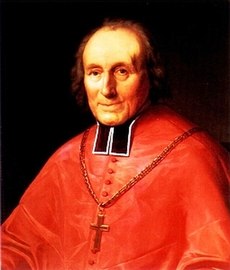Clemens August von Droste-Vischering
|
His Excellency Clemens August Droste zu Vischering |
|
|---|---|
| Archbishop of Cologne | |
 |
|
| Church | Roman Catholic |
| Archdiocese | Cologne |
| Appointed | 1 December 1835 |
| In office | 1835-1845 |
| Predecessor | Ferdinand August von Spiegel |
| Successor | Johannes von Geissel |
| Orders | |
| Ordination | 14 May 1798 |
| Consecration | 28 October 1827 by Kaspar Maximilian Droste zu Vischering |
| Rank | Archbishop |
| Personal details | |
| Born |
21 January 1773 Vorhelm (now a part of Ahlen), North Rhine-Westphalia, Germany |
| Died | 19 October 1845 (aged 72) Münster Germany |
| Nationality | German |
| Previous post | Auxiliary Bishop of Münster (1827-1835) |
Baron Clemens August von Droste zu Vischering, German Clemens August Freiherr von Droste zu Vischering (21 January 1773 – 19 October 1845) was an Archbishop of Cologne. His clashes with the Prussian government personified the conflict relationship between the Catholic Church and the Prussian-Protestant state power in the 19th century Germany.
Clemens August was born in Vorhelm (now a part of Ahlen, North Rhine-Westphalia) into the Westphalian noble family of Droste zu Vischering. His great-grandniece was Sister Maria Droste zu Vischering.
Besides attending the University of Münster, he had as private tutor the well-known church historian Johann Theodor Katerkamp (died 1834). At an early age, he was introduced into the circle of learned men who gathered around Baron Franz Friedrich Wilhelm Freiherr von Furstenberg, Vicar-General of the Diocese of Münster, and the pious and refined Princess Amelia von Gallitzin.
After completing his studies he began, in June 1796, an extensive Grand Tour, under the direction of Katerkamp, through Germany, Switzerland, and Italy, returning to Münster in August 1797.
On 14 May 1798, he was ordained priest by his brother Kaspar Maximilian Droste zu Vischering, Auxiliary Bishop of Münster. As a canon, he devoted himself to pastoral care.
In accordance with the wish of the aged Baron von Fürstenberg, Administrator of the Diocese of Münster, the cathedral chapter elected Clemens August as his coadjutor on 18 January 1807, and when Fürstenberg resigned six months later, Clemens August became his successor as Vicar-General.
As administrator, he founded in 1808 an independent congregation of Sisters of Mercy, the so-called Klemens-Schwestern, who were primarily involved in nursing. When in 1813 Münster became part of Napoleon's empire, the emperor appointed Baron von Spiegel as Bishop of Münster without the knowledge of the pope, but after Napoleon's fall, the pope restored Clemens August to his former office in March 1815.
...
Wikipedia
